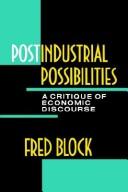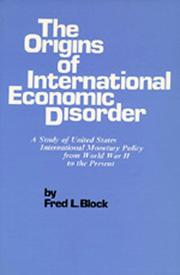| Listing 1 - 8 of 8 |
Sort by
|

ISBN: 156584193X Year: 1996 Publisher: New York, N.Y. New Press
Abstract | Keywords | Export | Availability | Bookmark
 Loading...
Loading...Choose an application
- Reference Manager
- EndNote
- RefWorks (Direct export to RefWorks)
Microeconomics --- Economic order --- United States --- Budget --- Competition --- Free enterprise --- United States of America

ISBN: 0520030095 Year: 1977 Publisher: Berkeley University of California press
Abstract | Keywords | Export | Availability | Bookmark
 Loading...
Loading...Choose an application
- Reference Manager
- EndNote
- RefWorks (Direct export to RefWorks)
International finance --- International economic relations --- Monetary policy --- Finances internationales --- Relations économiques internationales --- Politique monétaire --- United States --- Etats-Unis --- Foreign economic relations --- Relations économiques extérieures --- 339.73 --- -Monetary management --- Economic policy --- Currency boards --- Money supply --- Economic policy, Foreign --- Economic relations, Foreign --- Economics, International --- Foreign economic policy --- Interdependence of nations --- International economic policy --- International economics --- New international economic order --- International relations --- Economic sanctions --- Organisatie van internationaal betalingsverkeer. Bretton woods. --- Foreign economic relations. --- -Organisatie van internationaal betalingsverkeer. Bretton woods. --- 339.73 Organisatie van internationaal betalingsverkeer. Bretton woods. --- -Economic policy, Foreign --- Monetary management --- Relations économiques internationales --- Politique monétaire --- Relations économiques extérieures --- International monetary system --- International money --- Finance --- Organisatie van internationaal betalingsverkeer. Bretton woods

ISBN: 1282355694 9786612355691 0520910133 0585284687 9780520910133 9780585284682 9781282355699 9780520068131 0520068130 9780520069886 0520069889 0520068130 0520069889 Year: 1990 Publisher: Berkeley University of California Press
Abstract | Keywords | Export | Availability | Bookmark
 Loading...
Loading...Choose an application
- Reference Manager
- EndNote
- RefWorks (Direct export to RefWorks)
While it is often acknowledged that we live in a "postindustrial" age, our economic concepts have lagged far behind our postmodern sensibility. In this incisive new work, the well-known sociologist, Fred Block, sheds obsolete and shopworn economic analysis by presenting a bold, sweeping reconceptualization of the economy. Postindustrial Possibilities provides a fresh understanding of the dynamics of postindustrial change while offering a roadmap for future economic thinking.Block takes as his point of departure the tired concepts of neo-classical economics which, while still dominant, fall short as tools for comprehending contemporary economic forces. In Block's mind, the failure to revise the concepts of industrial economics means that the reality of today's economy is increasingly understood as "through a glass darkly." Intent on reinvigorating thinking in this area, Block masterfully critiques the central categories of neo-classical economics, such as the market, labor, and capital.Block argues that the neo-classical tradition has obscured the fact that capitalist prosperity has been built not on "free markets" but rather on systematic constraints on market freedom. He further suggests that measurements of capital have become increasingly problematic and that the concept obscures the critical sources of productivity within organizations. In his far-reaching analysis of the Gross National Product, Block shows that there is a growing divergence between the factors that determine people's well-being and trends in measured GNP.Postindustrial Possibilities sets forth a new intellectual paradigm that might be called "Qualitative Growth." One of its primary foci is a shift toward improved product quality and greater priority for various non-commodity satisfactions such as leisure, interesting work, economic security and a safe and clean environment. It also promotes a recognition that greater economic efficiency rests not on infusions of capital but on cooperative labor relations and on institutional reform.Wide-ranging, intellectually vibrant and lucid, Postindustrial Possibilities will engender controversy and debate. It is an enormous contribution that social scientists and policymakers will need to come to terms with.
Economic forecasting. --- Economics --- Forecasting --- Economic indicators --- capital. --- capitalism. --- classical economics. --- constrained markets. --- consumers. --- economic efficiency. --- economic forces. --- economic security. --- economics. --- economy. --- employees. --- free markets. --- gnp. --- industrial economics. --- labor industrial relations. --- labor relations. --- labor. --- leisure. --- market. --- neo classical economics. --- non commodity satisfactions. --- nonfiction. --- political economy. --- postindustrial. --- postmodern. --- product quality. --- regulation. --- sociology. --- work. --- worker satisfaction. --- workers. --- working conditions. --- workplace environment.
Book
ISBN: 0520959078 Year: 2018 Publisher: Berkeley, CA : University of California Press,
Abstract | Keywords | Export | Availability | Bookmark
 Loading...
Loading...Choose an application
- Reference Manager
- EndNote
- RefWorks (Direct export to RefWorks)
Virtually everyone-left, right, and center-believes that capitalist economies are autonomous, coherent, and regulated by their own internal laws. This view is an illusion. The reality is that economies organized around the pursuit of private profit are contradictory, incoherent, and heavily shaped by politics and governmental action. But the illusion remains hugely consequential because it has been embraced by political and economic elites who are convinced that they are powerless to change this system. The result is cycles of raised hopes followed by disappointment as elected officials discover they have no legitimate policy tools that can deliver what the public wants. In Capitalism, leading economic sociologist Fred L. Block argues that restoring the vitality of the United States and the world economy can be accomplished only with major reforms on the scale of the New Deal and the post-World War II building of new global institutions.
Globalization --- Capitalism --- Economic aspects. --- United States --- Economic policy. --- Politics and government. --- american capitalism. --- business. --- capital. --- capitalism. --- capitalist economy. --- capitalist system. --- change the system. --- economic determinism. --- economic development. --- economic policy. --- economic sociology. --- economics. --- economy. --- free enterprise. --- global institutions. --- governmental action. --- governments and governing. --- major reforms. --- money. --- policy tools. --- political elites. --- political theory. --- politics. --- private profit. --- profit. --- sociology. --- the new deal. --- united states of america. --- wealth and poverty. --- wealth. --- world economy.

ISBN: 0520037294 Year: 1977 Publisher: Berkeley University Of California Press
Abstract | Keywords | Export | Availability | Bookmark
 Loading...
Loading...Choose an application
- Reference Manager
- EndNote
- RefWorks (Direct export to RefWorks)
Book
ISBN: 9780520959071 Year: 2018 Publisher: Berkeley University of California Press
Abstract | Keywords | Export | Availability | Bookmark
 Loading...
Loading...Choose an application
- Reference Manager
- EndNote
- RefWorks (Direct export to RefWorks)
Virtually everyone--left, right, and center--believes that capitalist economies are autonomous, coherent, and regulated by their own internal laws. This view is an illusion. The reality is that economies organized around the pursuit of private profit are contradictory, incoherent, and heavily shaped by politics and governmental action. But the illusion remains hugely consequential because it has been embraced by political and economic elites who are convinced that they are powerless to change this system. The result is cycles of raised hopes followed by disappointment as elected officials discover they have no legitimate policy tools that can deliver what the public wants. In Capitalism, leading economic sociologist Fred L. Block argues that restoring the vitality of the United States and the world economy can be accomplished only with major reforms on the scale of the New Deal and the post-World War II building of new global institutions.
Book
Year: 1978 Publisher: Berkeley-Los Angeles-London University of California Press
Abstract | Keywords | Export | Availability | Bookmark
 Loading...
Loading...Choose an application
- Reference Manager
- EndNote
- RefWorks (Direct export to RefWorks)
Book
ISBN: 0674050711 0674416341 9780674416345 9780674050716 Year: 2014 Publisher: Cambridge, Massachusetts
Abstract | Keywords | Export | Availability | Bookmark
 Loading...
Loading...Choose an application
- Reference Manager
- EndNote
- RefWorks (Direct export to RefWorks)
What is it about free-market ideas that give them tenacious staying power in the face of such manifest failures as persistent unemployment, widening inequality, and the severe financial crises that have stressed Western economies over the past forty years? Fred Block and Margaret Somers extend the work of the great political economist Karl Polanyi to explain why these ideas have revived from disrepute in the wake of the Great Depression and World War II, to become the dominant economic ideology of our time. Polanyi contends that the free market championed by market liberals never actually existed. While markets are essential to enable individual choice, they cannot be self-regulating because they require ongoing state action. Furthermore, they cannot by themselves provide such necessities of social existence as education, health care, social and personal security, and the right to earn a livelihood. When these public goods are subjected to market principles, social life is threatened and major crises ensue. Despite these theoretical flaws, market principles are powerfully seductive because they promise to diminish the role of politics in civic and social life. Because politics entails coercion and unsatisfying compromises among groups with deep conflicts, the wish to narrow its scope is understandable. But like Marx's theory that communism will lead to a "withering away of the State," the ideology that free markets can replace government is just as utopian and dangerous.
Economics -- History. --- Economics -- Sociological aspects -- History. --- Free enterprise -- History. --- Polanyi, Karl, -- 1886-1964. --- Free enterprise --- Economics --- Business & Economics --- Economic Theory --- History --- History. --- Sociological aspects --- Polanyi, Karl, --- Economic theory --- Political economy --- Polányi, Károly, --- Social sciences --- Economic man --- Sociological aspects&delete& --- E-books --- Libre empresa --- Economía --- Historia --- Aspectos sociológicos
| Listing 1 - 8 of 8 |
Sort by
|

 Search
Search Feedback
Feedback About UniCat
About UniCat  Help
Help News
News